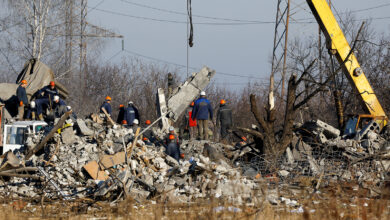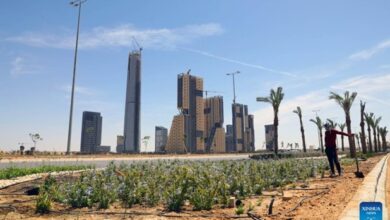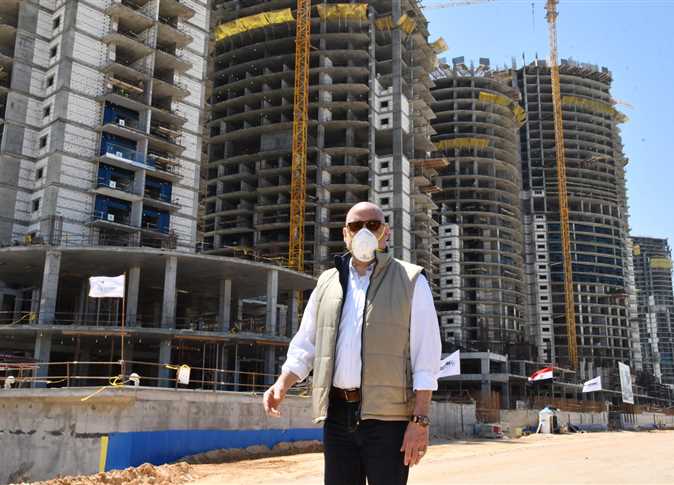Gamal Ramadan knocks against a bedroom wall and parts of it break off, setting free some cockroaches that were nesting inside.
The walls around his house are corroded and frail, as a result of the groundwater that is constantly seeping through, flooding his house in the Duweiqa slum.
“I work in construction and I know the risks involved with groundwater,” Ramadan says. “It will keep rising through the walls until the house collapses.”
A small channel is dug through Ramadan’s two-story house to drain the water. However, it is doing little to keep the rooms and walls dry.
Below a 16-meter-high sand dune and above groundwater, Ramadan lives with his five children, along with seven other families, bringing the total to almost 30 people.
“This sand could fall on us any second,” Abu Islam, one of Ramadan’s neighbors says. “It’s the result of the government’s attempt to bury the rockslide that crushed the residents in 2008. … There are people who were never pulled out until today, may they rest in peace.”
The Duweiqa shantytown suffered a rockslide in 2008, killing over 100 people and displacing many others. Following the disaster, the government identified Duweiqa as an “unsafe area.”
The implication of this classification on those who stayed on in the slum is clear. Ramadan describes the constant threat his family lives under.
“We sleep with one eye open,” he says. “One night, there was a pack of dogs running on the rock, and the loud noise scared us so much that we started running outside, carrying the children. But we finally realized it was just the dogs.”
The residents voice frustration about what they call the municipal council’s neglect of their dire conditions.
Sabah Hafez, one of Ramadan’s neighbors, says that when she complained to Mostafa Ebeida, former head of the municipality of Manshiyet Nasser, about their living conditions, telling him she was scared there would be another rockslide, “he told me they would come and pull us out as corpses.”
Ramadan explains he cannot afford to relocate on his own or pay rent. “If I had anywhere else to stay I would’ve left,” he says.
Following the rockslide, some families were relocated to the neighboring housing project, 10,000 units commissioned by former first lady Suzanne Mubarak. But many others remain in the slum, despite repeated warnings from geologists and rights groups of another catastrophe.
Last January, some of the Duweiqa residents held a sit-in in front of the Cairo Governorate building, calling for proper housing. However, their demands were overshadowed by the violence that ensued there on the revolution’s second anniversary.
Today, they are caught between a bureaucracy dubbed corrupt and plagued by institutional changes, and trying to combat poverty through means deemed illegitimate.
Residents to blame
While slum dwellers complain of government negligence, government officials say there are impediments slowing down the process.
Khaled Nasr, head of the Manshiyet Nasser municipal council, says the government has taken a special interest in Duweiqa’s informal housing since the rockslide, but is faced with several hurdles that hinder the relocation process.
He explains that when the government conducts a census in the area, some families ask their relatives to settle in their homes and pretend to live there so they can get apartments they have no right to.
He laments the complicity of some of the municipality’s employees, who alert the residents to the census. This, Nasr says, forces the government to sometimes conduct surprise visits at 3 am to make sure the people in the houses are their actual residents.
Nasr also says several families received their apartments, but sold them and returned to reside in the shantytown, a claim residents vehemently deny.
Ramadan’s family says someone received the apartments on their behalf, a complaint Nasr dismisses.
He says the people who received apartments have to submit a significant amount of paperwork and that their names have to be on a list.
Nasr refers to a file on his desk that includes the names of 17,000 people in need of housing, as collected by the government census.
Meanwhile, the process of evicting the current slum dwellers is not proving easy.
Um Mahmoud, a resident of Duweiqa, worries that her three-story house, which houses more than 25 people, will collapse in the middle of the night.
After the rockslide in 2008, Um Mahmoud’s family was approached to relocate in tents until an apartment was ready. However, they refused to leave unless they were given their keys.
“They have our ID numbers and all of our information but we were never given any apartments,” her daughter, Wafaa Mabrook, who has polio, says.
The fragile, cracked walls are not the family’s only concern. Um Mahmoud and Mabrook say they face intimidation by other residents who do not want to leave their homes in the slum. The mother and daughter were very cautious about talking to journalists, claiming other reporters were beaten and had their cameras broken as they tried to talk to people who wanted to relocate, since they worry that this will bring attention to them and force them to leave the slum.
These residents, Um Mahmoud says, rebuilt their homes after the rockslide and are at less risk than her family.
“They intimidate us and start fights with whoever talks about leaving the slums,” she says.
This, Nasr says, is another problem facing the municipal council, as they experience difficulty evicting the slum dwellers.
A corrupt administration
Manal al-Tiby, head of the Egyptian Center for Housing Rights, explains that the 10,000 housing units allocated for slum dwellers have all been occupied, both by Duweiqa residents as well as others from different shantytowns. Consequently, some Duweiqa residents were relocated to other housing projects in 6th of October City or other distant areas, where services are scarce.
She explains that this forced them to return to live in their fragile homes in Duweiqa.
Others, she says, have yet to receive new apartments. Tiby explains that the government has been dragging its feet in offering housing alternatives, especially since the 25 January revolution.
“Before the revolution, the government was slow in responding to housing crises but at least there were procedures to follow, but now who do we talk to?” she asks. “Disorder struck and the state has been absent.”
Nasr says the problem that is slowing down the relocation process is that housing units in 6th of October City are under the control of thugs who seized them, taking advantage of the security vacuum that has ensued since the uprising.
He says, however, that the governorate is working on reclaiming those units in coordination with the municipality council.
Nasr acknowledges the risks facing the slum dwellers and recognizes the need for eviction; however, he says the municipal council needs help from security forces, who are steering clear of the issue.
“They are worried about clashes with the residents, so they are of no help,” Nasr says.
Nasr, who only joined his post earlier this month and says he is already in over his head, also refers to an administrative problem.
“I used to blame [President Mohamed] Morsy before I came here but now I understand his position,” he says. “It’s not easy to turn things around.”
He explains that the area used to deal with a “corrupt administration rather than administrative corruption.”
Nasr says it is very difficult to find someone to trust and that he sometimes resorts to inspecting the homes himself.
The municipal council’s head is the first engineer to hold this position. His predecessors were either army or police generals.
He highlights the importance of an engineer working in the municipality, since the area’s problems generally have an engineering dimension.
“With all due respect to the generals, they were used to a certain administrative system and you need someone with an engineering background, especially in this area,” Nasr says.
Meanwhile, back in Duweiqa, Nasr says the governorate is working on a re-housing plan whereby they would relocate residents gradually, three blocks at a time.
Tiby, who has been working in Duweiqa since 2000, blames the complicated situation on state corruption, but does admit there is a degree of “deception” on the part of some of the residents.
Nevertheless, she remains skeptical, wondering where the families will be moved since the housing units allocated for them in Duweiqa are already occupied.
This piece was originally published in Egypt Independent's weekly print edition.




